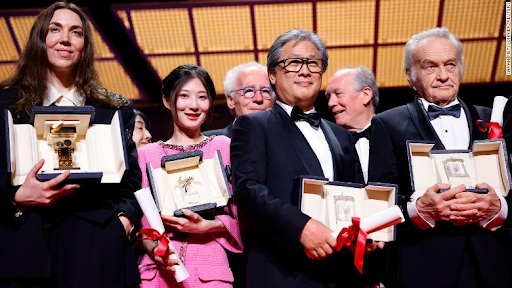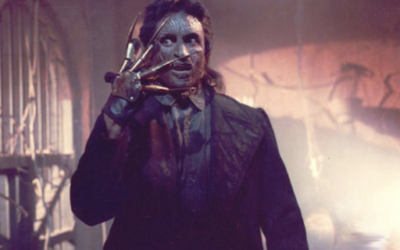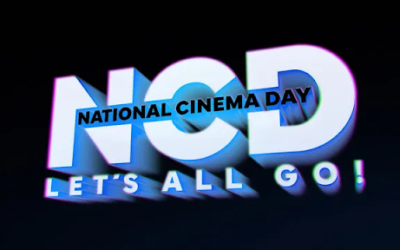Source: CNN
This year’s Cannes Film Festival, held between May 17th and May 28th, marked the seventy-fifth year in a row in which the world-renowned event took place, and the timing could not be more perfect for the festival to make a big comeback. Due to restrictions put in place by the French government in order to combat the COVID-19 pandemic, the previous two Cannes Film Festivals had to contend with both delays and significant modifications to how film screenings took place, with many of them being held online instead of in person at a given film exhibition venue. This year’s festival, however, saw a return to something resembling normal conditions, with nearly all of the forty-one films included as part of the event – twenty-one of which are In Competition, while the other twenty are Un Certain Regard – being shown in a theater at least once over the course of the festival’s twelve-day period. With the benefit of the big screen working to each of these films’ advantage, plenty of strong impressions were made on jury members and all others who were able to attend the event. Still, with only a small number of awards to hand out, Cannes jurors could only select a handful of these films to deem the best of the best, but as challenging as that task may have been, these decisions were made nonetheless, and the finest of this festival’s batch of cinematic achievements was revealed before its conclusion on May 28th.
Of the awards handed out, there are none superior to the Palme d’Or, Cannes’ equivalent of a Best Picture prize. This year, the big winner was “Triangle of Sadness”, an English-language international co-production between France, Sweden, and others. Directed by Swedish director Ruben Östlund and starring Harris Dickinson, Charlbi Dean, and Woody Harrelson, this satirical dark comedy film revolves around a celebrity couple who go on a luxury cruise and get caught up in all sorts of crazy and dangerous events. The eight-minute standing ovation the film received at the end of its screening all but confirmed that the film had left a huge impression on those who saw it, and its eventual Palme d’Or victory further cemented how much it was appreciated. Whether or not the film will have similar success with awards later on in the year is not yet certain, but previous Palme d’Or winner “Parasite” proved that Academy voters do pay close attention to Cannes, and considering that that film’s North American distributor Neon is also distributing “Triangle of Sadness”, it wouldn’t be surprising if the company attempted to include the film as part of a major awards campaign.
Meanwhile, the Grand Prix award, considered by many to be the runner-up to the Palme d’Or, was a tie going to two different films. The first of these films was “Close”, a Belgian drama from director Lukas Dhont that revolves around the friendship between two adolescent boys and the conflicts that arise with getting older and closer to adulthood. The second Grand Prix winner was “Stars at Noon”, a co-production between France, Panama, and the United States directed by French director Claire Denis. Featuring such talents as Joe Alwyn, Margaret Qualley, and John C. Reilly, the film centers around an English businessman and an American journalist who must find a way to escape the nation of Nicaragua while simultaneously falling in love with one another. It’s not often that this award goes to two films at the same time, but given the warm reception both films have received, it’s not hard to understand why it may have been hard to decide between the two.
Lastly, there is the Jury Prize, which is determined by a select jury from a very specific “official selection” of films. As was the case with the Grand Prix award, two films were awarded with the honor this year. The first of these films was “EO”, a Polish drama from director Jerzy Skolimowski that tells the life story of a donkey born into a Polish circus. The second film to win the Jury Prize was “The Eight Mountains”, an Italian-language drama directed by Felix van Groeningen about two friends who lived in a small Alpine village as children and eventually reunited during their adulthood. Again, for this award to go to two different films is not something that happens all the time, but it does show how admired these films are for the jury to be somewhat split as to which of them was the better of the two.
Although the previously discussed awards were the main prizes handed out at this year’s festival, there were still plenty of smaller accolades to hand out alongside them. The award for Best Director, for example, went to Park Chan-wook for his film “Decision to Leave”, a South Korean mystery in which a detective falls in love with a recently widowed young woman who becomes the prime suspect in the murder being investigated. As for the award for Best Screenplay, Tarik Saleh took home the honor for the script he provided for “Boy from Heaven”, a thriller set in Egypt that shows a young fisherman’s son traveling to Cairo to study at the Al-Azhar University, only to inadvertently get tangled up in an ongoing struggle between the nation’s political and religious elite.
Then there are the prizes for acting, of which two were handed out at this year’s festival. The first of these was Best Actress, which was given to Zar Amir Ebrahimi for her performance in Ali Abbasi’s Persian-language crime thriller “Holy Spider”, based on the true story of a serial killer who targeted and killed sixteen different women in Mashhad, Iran between the years 2000 and 2001. The award for Best Actor, meanwhile, went to Song Kang-ho for his work in the South Korean drama “Broker”, in which his character takes part in the illegal selling of babies in the adoption black market and ends up going on a road trip with one of these babies’ mother in order to interview the child’s prospective parents.
Plenty of other awards were handed out over the duration of the festival, from the Honorary Palme d’Ors given to actors Tom Cruise and Forest Whittaker to the various Un Certain Regard prizes. Even with so many awards given though, one thing is certain above all else: this year’s Cannes Film Festival, one meant to serve as the event’s big comeback, was miraculously a solid success.




